Maharashtra to promote students to class 11 even if they fail in Math and Science: How fair is it?

In a recent development, aimed at reducing dropout rates and offering greater flexibility to students, the Maharashtra government has updated its State Curriculum Framework for School Education (SCF-SE). The new policy allows Class 10 students who fail to score the minimum passing marks in mathematics and science to enrol in Class 11, provided they secure at least 20 marks.This shift is being touted as a major step towards ensuring that academic challenges in specific subjects do not derail students’ educational journeys.
Under this framework, students who score between 20 and 34 marks in these core subjects will be permitted to advance to Class 11 but will be restricted to streams that exclude mathematics and science. They are also given the option to retake exams to improve their marks, should they wish to pursue higher education courses that require these subjects. The move has sparked debates about fairness, educational standards, and the overall impact on students’ futures.
How will this policy benefit students?
Critics argue that this policy may bring down academic standards. But there are potential benefits too. The policy aims to reduce dropout rates, encourage career diversity, and accommodate students with different learning styles, promoting a more inclusive education system. Here is a look at the ways the new policy will help students.
Reduced Dropout Rates: One of the most compelling advantages of this policy is its potential to significantly reduce dropout rates. Students struggling with mathematics and science no longer face the prospect of abandoning their studies entirely due to poor performance in these subjects. This flexibility encourages them to continue their education and explore streams more suited to their strengths.
Supporting Diverse Learning Styles: Not all students excel in science and mathematics. For those who struggle with these subjects but demonstrate talent in other areas such as the arts or humanities, this policy provides an opportunity to thrive. It recognises that intelligence and capability come in many forms, not just through proficiency in traditional academic subjects.
Encouraging Career Diversity: The policy opens the door to career paths outside the rigid science and technology streams. By allowing students to focus on subjects they are passionate about, this approach promotes career diversity and encourages students to pursue vocational courses or creative fields that may not require advanced knowledge of mathematics or science.
Reducing Pressure on Students: The high stakes associated with passing mathematics and science in Class 10 can lead to immense stress for students. By lowering the passing criteria, this policy can ease the pressure on students, helping them to focus on long-term learning rather than short-term performance.
Demerits of the policy
Maharashtra’s decision to promote students to Class 11 despite failing in Math and Science is a controversial move that risks lowering educational standards and fostering complacency among students. Critics argue it sends the wrong message, compromising academic rigour and diminishing the value of essential subjects, ultimately undermining the quality of education. Here is a look at the negative impact this policy may have on education.
Undermining Core Subject Competency: By allowing students to advance to Class 11 without meeting the minimum passing marks in essential subjects like Math and Science, the policy dilutes the importance of acquiring foundational knowledge. Mathematics and Science are critical for cognitive development, logical reasoning, and problem-solving skills. If students are not required to meet basic proficiency levels, it could lead to a weaker understanding of fundamental concepts, affecting their future academic and career pursuits.
Encouraging a Culture of Minimal Effort: The new policy could inadvertently encourage students to adopt a lackadaisical attitude towards their studies, knowing that even if they do not pass, they can still progress. This complacency may lead to a decrease in overall academic performance, as the pressure to meet the minimum required standards is lifted. Over time, this could weaken the motivation to excel and foster a mindset of doing just enough to get by.
Limited Career Choices: While the policy allows students to continue their education, it also restricts their options. Those who pass with lower marks will not be able to pursue higher education courses that require a strong foundation in mathematics or science. This could limit their career choices later in life, particularly in fields like engineering, medicine, or computer science.
Inconsistent Academic Foundation: By permitting students with low scores in Math and Science to move on, the policy creates an uneven educational foundation. Students advancing without sufficient grasp of these core subjects may struggle in higher classes, even if they choose streams that exclude Math and Science. Such inconsistencies can lead to gaps in understanding and an inability to grasp complex concepts in other subjects, affecting their ability to pursue higher education or specialised careers.
Reduced Classroom Expectations: Teachers might lower their expectations for student performance, knowing that failing in key subjects does not prevent students from advancing. This could lead to a less rigorous teaching approach, impacting the quality of education delivered. If educators are not pushed to help students achieve the necessary competencies, the overall learning environment could suffer, resulting in a diluted educational experience.
Low Accountability and Academic Integrity: If students can progress without passing crucial subjects, it raises concerns about the integrity of the academic system. The policy might weaken the accountability of both students and educators, as the motivation to improve performance is diminished. Without strict academic standards, the value of achieving excellence in education could be compromised, affecting the credibility of the educational system.
Normalising Poor Academic Performance: Implementing this policy could set a dangerous precedent, where not achieving the required marks is normalised rather than seen as an area that requires attention and improvement. If students are not held accountable for their performance in fundamental subjects, it may lead to a broader acceptance of mediocrity, affecting the quality of future professionals and leaders emerging from the education system.



